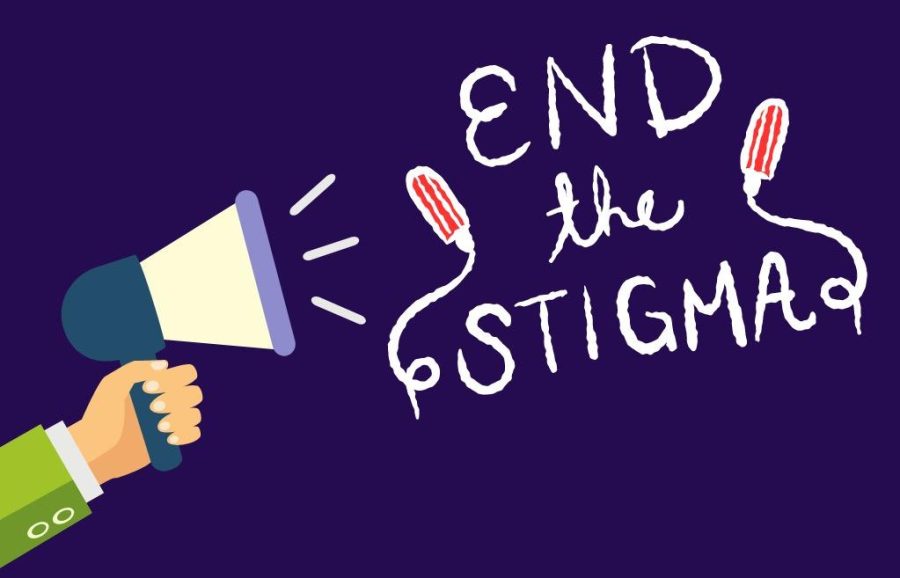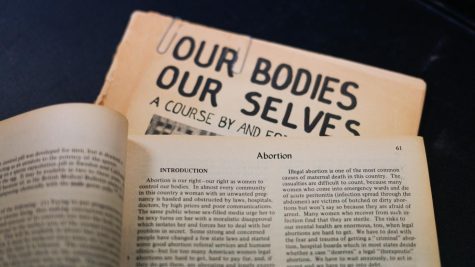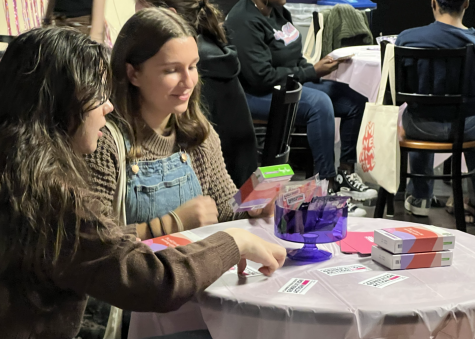The Politics of Menstruation: How Boston organizations and local policymakers are working to end stigma and increase access to period products
“How do you tell a parent who’s working two to three jobs, paid $15 an hour, that they need to spend more than half of what they’re getting paid an hour on a box of tampons and pads when they still have to feed the whole family?”
Increasing the accessibility of menstrual products in public buildings is a major policy issue for this upcoming legislative term. Both statewide grassroots activists and government officials are pushing for the passage of several bills related to menstrual justice.
Menstrual equity advocates have been working to make period supplies more available throughout the state, from elementary school students in Salem pushing for available products at their school to the founding of the Massachusetts Menstrual Equity Coalition by the state chapter of The National Organization for Women. After years of organizing, menstrual leaders might finally see their efforts reflected in policy. At the start of a new legislative session, there has been increased engagement from government officials, but passing menstrual justice legislation is only the first step in addressing inequity and the roots of menstrual shame.
This stigma has been internalized and pushed out of public consciousness, said Charlotte Powley, an assistant teaching professor of public health at Simmons University. Menstrual discourse must be brought to the surface, she said, both in our everyday lives and in policy.
“[Menstrual equity] hasn’t reached the forefront of agendas because it’s been so silent,” Powley said. “It’s been such a case of invisibility.”
Bill S.1274, also known as the I AM Bill, was first introduced to the Massachusetts Legislature in 2019, and it aimed to provide access to disposable period products in prisons, homeless shelters and public schools. Although it was thwarted by the pandemic during the 2019-2020 session, menstrual activists were hopeful after the bill passed the Senate in 2022 . However, the bill did not make it to the House, forcing organizations to begin advocating again with a new legislature following the November 2022 elections.
Menstrual activist Allyson Crays, a law student at Northeastern University and member of the coalition, spoke about the movement’s current efforts to increase co-sponsorships of the bill — a necessary step in making sure the bill gets pushed through both the House and Senate this session.
“If we only have a couple of co-sponsors, it might not show as much of a priority in the legislature, and so it won’t be brought through a vote or moved through committees as fast,” she said.
Crays added that finding co-sponsors may prove easier this session than in previous ones due to an “increase of engagement” from the state level and more locally.
“We’ve heard from some newly elected local city officials that they want to know how to pass period policy in their towns and cities,” she said. “That’s a really important piece, and it doesn’t just have to be statewide bills as well — there’s local action that people can take.”
This legislative session, there are five total bills focused on menstrual equity. While the I AM Bill might be the most comprehensive, Crays said, the proliferation of bills relating to menstruation gives activists hope that policy will actually be pushed through and adopted by the state.
Powley said that even if the I AM Bill is passed, there will still be a wait to see how legislation is actually implemented statewide and whether it will actually combat menstrual stigma.
“I think part of why the policy itself is so necessary is not only having that higher-level support, but I think it has a lot to do with destigmatizing,” she said. “If we’re getting people at the highest levels of our government saying, ‘We’ve identified this as a necessity; we’ve identified it as a priority,’ I think we’ll see culture shift and change.”
Alexandra Valdez, executive director of the Mayor’s Office of Women’s Advancement, discussed how the department supports the I AM Bill. She specifically called attention to how menstrual inequity affects communities of color in Boston. Because wealth disparities operate according to race, she said many communities of color are left financially unable to prioritize quality menstrual products.
“How do you tell a parent who’s working two to three jobs, paid $15 an hour, that they need to spend more than half of what they’re getting paid an hour on a box of tampons and pads when they still have to feed the whole family?” Valdez said. “When you think about that and about how that affects our Black and Brown communities, it’s huge.”
While access to product should be a right, not a privilege, Chris Bobel, a professor of women’s, gender and sexuality studies at the University of Massachusetts Boston believes that the scope of menstrual activism should be expanded to address the root of inequity. She stressed that having an entirely product-focused agenda can limit the movement.
“The current frame is very much about stuff people need to bleed on,” she said. “That frame is really narrow because it misses the other three phases of the menstrual cycle… It leaves out perimenopause and menopause. It really shrinks a complex reality that is across the life course and different for different populations.”
Bobel noted that products themselves are not the issue, since the reality is that they are necessities and access is important. Rather, increasing access to products, and access alone, does not accurately address systems of oppression that are at the root of menstrual shame.
Part of addressing this shame is rooted in the language used both in everyday life and in legislation. Crays emphasized that for too long, people have skirted around this topic, as it’s often uncomfortable to discuss and that menstruation as a conversation has remained well outside the State House. Without efforts toward destigmatizing menstruation, “then we’re just getting access to products and covering it up further,” Cray said, calling it a “Band-Aid” fix.
If the I AM Bill is passed this session, there will still be more work to be done in order to further get to the root of menstrual stigma. Part of this work includes educating menstruators and non-menstruators alike.
“If I were to think about what activism will look like,” Valdez said, “it’s exactly what we’re doing right now which is raising awareness, having conversations about it and also making sure that we are educating our residents to know that this is not just a women’s issue, this is an everyone issue.”
Currently, menstrual education within schools is largely outsourced to the same corporations that make period products, said Bobel. Further legislation must include all-inclusive training for educators responsible for leading health curricula.
To fully achieve menstrual equity and empowerment, Bobel stressed that there is strength in numbers and that activists must continue to work together to push for change.
“It’s not enough to put your foot in the door,” she said.” You gotta actually pry it open, walk through it and bring other people with you. And I think we have that potential. So that gives me hope.”









